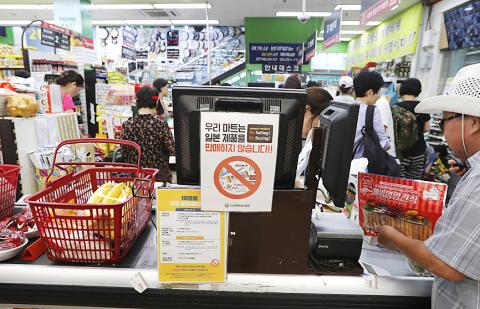Japan yesterday said that it does not plan to retract or renegotiate its stricter controls on high-tech exports to South Korea, a day after South Korean President Moon Jae-in urged that the issue be resolved through diplomacy.
Tokyo last week tightened the approval process for Japanese shipments of photoresists and other sensitive materials to South Korean companies.
Such materials can only be exported to trustworthy trading partners, Japanese officials have said, hinting at security risks without citing specific cases.

Photo: AP
They have rejected suggestions that the move was driven by worsening ties between the two nations related to historical issues.
“The measure is not a subject for consultation and we have no intention of withdrawing it either,” Japanese Chief Cabinet Secretary Yoshihide Suga told a news conference.
He was responding to Moon’s appeal for a diplomatic solution thorough “sincere” bilateral discussions, urging Tokyo to withdraw what he described as a politically motivated measure.
Moon on Monday said that Seoul would be forced to take countermeasures if the restrictions on materials used mainly in semiconductors and displays cause damage to South Korean companies, as the curbs have raised concern over possible disruptions for South Korean manufacturers and global supply chains.
The South Korean Ministry of Trade, Industry and Energy said that Seoul plans to file a complaint with the WTO.
Japan’s trade measures followed South Korean court rulings ordering Japanese firms to compensate South Korean plaintiffs for forced World War II labor.
The export restrictions cover fluorinated polyimides, which are used in organic light-emitting diode screens for TVs and smartphones, as well as photoresist and hydrogen fluoride, used for making semiconductors.
Japanese officials have said that those chemicals are sensitive materials that could be used in fighter jets, radars and chemical weapons, and the decision to tighten controls was based on a lack of trust that posed a risk to national security.
Japanese Prime Minister Shinzo Abe and his aides have hinted that there might have been illegal transfers of sensitive materials from South Korea to North Korea.
South Korea has summoned a Japanese embassy official to protest Abe’s suggestion that it could not be trusted to faithfully implement sanctions against the North, South Korean Ministry of Foreign Affairs spokesman Kim In-chul said.
South Korean Minister of Trade, Industry and Energy Sung Yun-mo said that an “emergency inspection” found no sign of illegal transactions.

Tropical Storm Gaemi strengthened into a typhoon at 2pm yesterday, and could make landfall in Yilan County tomorrow, the Central Weather Administration (CWA) said yesterday. The agency was scheduled to issue a sea warning at 11:30pm yesterday, and could issue a land warning later today. Gaemi was moving north-northwest at 4kph, carrying maximum sustained winds near its center of up to 118.8kph and gusts of 154.8kph. The circumference is forecast to reach eastern Taiwan tomorrow morning, with the center making landfall in Yilan County later that night before departing from the north coast, CWA weather forecaster Kuan Shin-ping (官欣平) said yesterday. Uncertainty remains and

SEA WARNING LIKELY: The storm, named Gaemi, could become a moderate typhoon on Wednesday or Thursday, with the Taipei City Government preparing for flooding A tropical depression east of the Philippines developed into a tropical storm named Gaemi at 2pm yesterday, and was moving toward eastern Taiwan, the Central Weather Administration (CWA) said. Gaemi could begin to affect Taiwan proper on Tuesday, lasting until Friday, and could develop into a moderate typhoon on Wednesday or Thursday, it said. A sea warning for Gaemi could be issued as early as Tuesday morning, it added. Gaemi, the third tropical storm in the Pacific Ocean this typhoon season, is projected to begin moving northwest today, and be closest to Taiwan on Wednesday or Thursday, the agency said. Today, there would likely

DISRUPTIONS: The high-speed rail is to operate as normal, while several airlines either canceled flights or announced early departures or late arrivals Schools and offices in 15 cities and counties are to be closed today due to Typhoon Gaemi, local governments announced last night. The 15 are: Taipei, New Taipei City, Taoyuan, Tainan, Keelung, Hsinchu and Kaohsiung, as well as Yilan, Hualien, Hsinchu, Miaoli, Chiayi, Pingtung, Penghu and Lienchiang counties. People should brace for torrential rainfall brought by the storm, with its center forecast to make landfall on the east coast between tonight and tomorrow morning, the Central Weather Administration (CWA) said. The agency issued a sea warning for the typhoon at 11:30pm on Monday, followed by a land warning at 11:30am yesterday. As of

CASUALTY: A 70-year-old woman was killed by a falling tree in Kaohsiung as the premier warned all government agencies to remain on high alert for the next 24 hours Schools and offices nationwide are to be closed for a second day today as Typhoon Gaemi crosses over the nation, bringing torrential rain and whipping winds. Gaemi was forecast to make landfall late last night. From Tuesday night, its outer band brought substantial rainfall and strong winds to the nation. As of 6:15pm last night, the typhoon’s center was 20km southeast of Hualien County, Central Weather Administration (CWA) data showed. It was moving at 19kph and had a radius of 250km. As of 3pm yesterday, one woman had died, while 58 people were injured, the Central Emergency Operation Center said. The 70-year-old